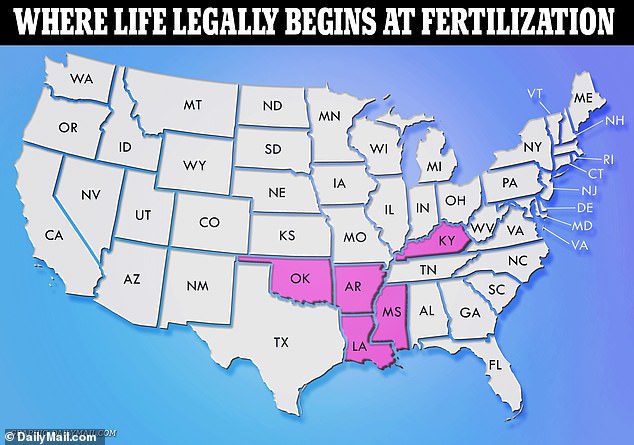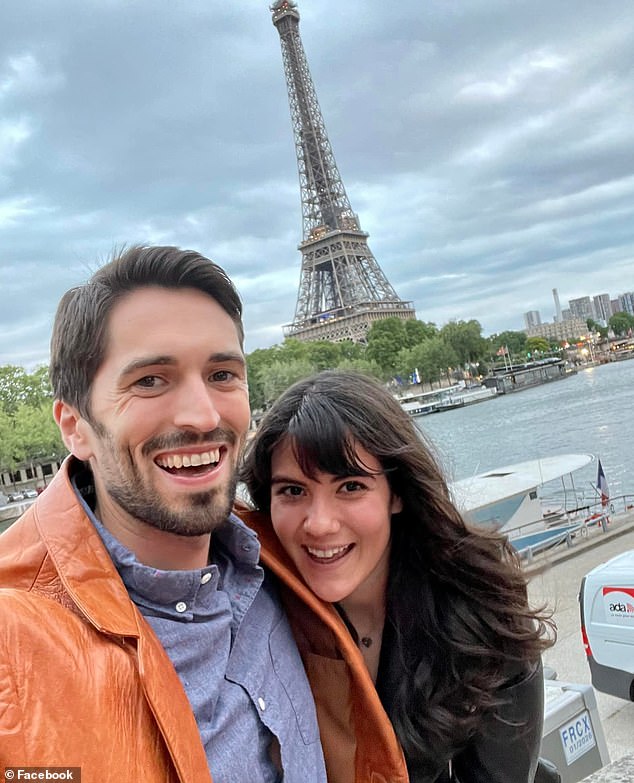‘I don’t want to implant a child I know will miscarry’: Families and doctors left in limbo after Alabama rules embryos are children — so which states could be next?
The Alabama Supreme Court’s ruling that frozen embryos are children under state law sent shockwaves across the country and left many wondering which states could be next.
In the wake of the court ruling, which means people could theoretically be charged with destroying an embryo, doctors in Alabama have been fielding calls from nervous patients like Gabby Goidel, 26, who opted to try in vitro fertilization after several miscarriages due to unexplained genetic problems. infertility.
She chose IVF because the process allows doctors to test embryos for abnormalities. Ms. Goidel believes it would not be fair to her or any child to carry a non-viable fetus that could miscarry or be born with serious health problems.
University of Alabama hospitals have already halted IVF treatments out of fear that doctors will be sued.
Auburn, Alabama native Gabby Goidel chose IVF due to an unexplained genetic fertility problem. But she now worries about the impact the Alabama ruling will have on her chances of becoming pregnant

The highlighted states have laws on the books that stipulate that life begins at the moment of fertilization. In Louisiana, the intentional removal or destruction of a human embryo is illegal
UAB spokeswoman Hannah Echols said, “We must evaluate the possibility that our patients and our physicians could face criminal charges or damages for following the standard of care for IVF treatments.”
The Alabama Supreme Court’s unprecedented ruling is the first to grant full human rights to an organism so soon after fertilization and opens the door for similar rulings in other states.
Ms Goidel said she was filled with fear when she heard the news.
She told NBC News: “Most of our embryos will not be genetically normal.
“My hope would be that we can pass those embryos naturally, but now it’s, ‘Should we save them?’ “I don’t necessarily want to implant a child who I know will miscarry.”
The ruling could open the door to wrongful death lawsuits in all cases where embryos do not survive thawing and being replaced in the womb, potentially forcing doctors in the state to flee elsewhere to practice medicine.
IVF advocates have warned for years that restrictions on IVF were a possible backlash to the Supreme Court’s 2022 decision overturning Roe v. Wade.
Barbara Collura, CEO of Resolve: The National Infertility Association, said: ‘This is exactly what we were afraid of and worried about.
“We are extremely concerned that this will now happen in other states.”
Ms. Collura added that the lawsuit did not declare IVF illegal, “but it did say that the embryos handled in an IVF process are children. His people. And that begs the question: can we freeze a person? And if we freeze a person, who is liable?’
The ruling is limited to Alabama, but reproductive rights advocates have warned of a possible domino effect elsewhere.
Kelly Baden, vice president for public policy at the abortion rights group Guttmacher Institute, told DailyMail.com: ‘This radical concept of personhood has long been championed by the anti-abortion movement and is now one step closer to reality.
‘The potential consequences are enormous: your ability to start a family, continue a healthy pregnancy or choose abortion is all interrelated; judicial and legislative attacks on one impact all.”
Which state will be next remains to be seen. A handful of others, including Louisiana, Arkansas, Kentucky and Missouri, have laws on the books that say human life begins at the moment of fertilization and that embryos are given the same rights as a person.

Mrs. Goidel and her husband
In Louisiana, it is illegal to dispose of embryos, which are called “legal entities.” In Kansas, lawmakers introduced a bill last year that would create a new crime of “unlawful destruction of a fertilized embryo.”
A an estimated 1.5 million embryos are currently in cryogenic farms in the US.
A lawsuit alleging wrongful death in the case of a discarded embryo could reach the courts in those states, forcing judges to issue a ruling with a similar impact. Or the state legislature would have to pass and enact a law banning the removal of embryos and possibly penalizing those who do so.
IVF is a process in which eggs from a woman’s ovaries are fertilized outside the uterus and implanted into the woman’s uterus. Doctors typically fertilize as many healthy eggs as possible to give the woman the best chance of having a baby; unused fertilized eggs are frozen and stored.
Eventually the unused embryos are discarded, but when depends on the clinic and what the patient needs.
With potential consequences for discarding the unused embryos, doctors may be barred from fertilizing eggs that ultimately do not implant. This reduces a woman’s chances of becoming pregnant.
Doctors typically fertilize as many eggs as they can retrieve during an IVF cycle, but, under possible civil penalties, may only feel comfortable fertilizing a few eggs, forcing women to undergo several rounds of costly egg retrieval to achieve the same pregnancy rate if they do. tried to achieve with one pick-up.
Suppliers may also be forced to leave the state for fear of a lawsuit or because of the high costs of storing excess embryos. IVF patients also have to pay fees for embryo storage, ranging from $350 to $1,000 per year.
About one in five American women cannot become pregnant, and roughly a third have undergone fertility treatment themselves or know someone who has. For women under age 35, IVF is successful about 47 percent of the time.
The Alabama landscape has made the Goidels reconsider staying there.
Gabby said: ‘We’re a very traditional family who just wants to have a child, so I never realized this would be a moral issue.
“We really envisioned starting a life here and probably retiring here. We are very unsure whether we want to leave or not.’
